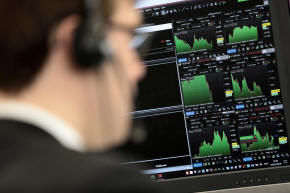Stocks weak, bond bashing alive and kicking as U.S. CPI looms
 Send a link to a friend
Send a link to a friend
 [April 12, 2022] By
Dhara Ranasinghe [April 12, 2022] By
Dhara Ranasinghe
LONDON (Reuters) - World stocks slipped to
their lowest levels in almost a month, the dollar held firm and selling
again gripped the world's biggest bond markets on Tuesday ahead of data
expected to show annual U.S. inflation rising at its fastest pace in 40
years.
With U.S. 10-year Treasury yields rising to new highs above 2.80%,
levels last seen late 2018, unease that an aggressive policy response to
inflation from the U.S. Federal Reserve could undermine economic growth
weighed on sentiment.
European shares opened 1% lower, Japan's blue-chip Nikkei stock index
shed 1.81% and trade in U.S. equity futures pointed to a weak open for
Wall Street.
That all left MSCI's world equity index flagging at its lowest levels in
almost a month.
Economists polled by Reuters forecast the U.S. consumer price index
(CPI) would post an 8.4% year-over-year increase in March, versus a 7.9%
rise a month earlier.

"Markets have decided that central banks are late and need to do more to
tame inflation, and moderate volatility in equities is not enough to
stop this," said Nordea chief analyst Jan von Gerich.
"The reason for the wobble in equity markets is higher rates and
geopolitics."
In early London trade, U.S. 10-year Treasury yields were up 5 basis
points, while benchmark German Bund yields climbed to almost 0.88%,
their highest level since 2015.
Federal Reserve Governor Chris Waller on Monday described rate hikes as
a "blunt force" tool that may act like a "hammer", causing collateral
damage to the economy.
STRONG DOLLAR
Higher Treasury yields supported the dollar.
The dollar index, a measure of the greenback's value against six peers,
was back above 100 to touch its highest level in almost two years.
The dollar was a touch firmer at 125.50 yen, having risen on Monday to
its highest since June 2015 at 125.77.
Japan's yen has hurt by the Bank of Japan's commitment to maintaining
ultra-easy policy even as the likes of the Fed embark on tightening
monetary policy.

[to top of second column] |

A broker looks at financial information on computer screens on the
IG Index the trading floor in London, Britain February 6, 2018.
REUTERS/Simon Dawson

And even latest warnings from Japanese policymakers, with Prime Minister Fumio
Kishida warning on Tuesday that rapid currency moves are undesirable, failed to
shore up the yen, which has shed over 3% this month.
The euro was also down 0.1% at $1.0869, unable to hold on to gains from a
mini-relief rally on Monday after French leader Emmanuel Macron beat far-right
challenger Marine Le Pen in the first round of presidential voting.
China's markets and oil prices gained ground as signs emerged that some of the
COVID-19 restrictions were starting to ease in financial hub Shanghai, though
dozens of other cities remain in partial or full lockdown.
An easing of China's regulations on the gaming sector also gave investors heart
after a multi-year crackdown on parts of the country's technology industry.
China's blue chip CSI300 Index dipped into negative territory mid-session but
roared back in the afternoon to rally almost 2%, which analysts attributed to
the gaming restriction changes.
"The next few days and weeks in China are going to be challenging, COVID cases
are still going up, but investors should not be focused just on COVID," said
Suresh Tantia, a Credit Suisse strategist.

"The big story for China though is political easing and tech regulations
starting to subside. Tech stocks have bounced today and we think there will be
more policy easing so there is a situation where China will be easing when the
rest of the world is tightening."
Brent crude rose 2.5% to $100.96 per barrel, while U.S. crude was almost 2.6%
higher at $96.77.
Spot gold was little changed around $1,953 per ounce. GOL/
(Reporting by Dhara Ranasinghe; additional reporting by Scott Murdoch in HONG
KONG; editing by Nick Macfie)
[© 2022 Thomson Reuters. All rights
reserved.]This material may not be published,
broadcast, rewritten or redistributed.
Thompson Reuters is solely responsible for this content. |